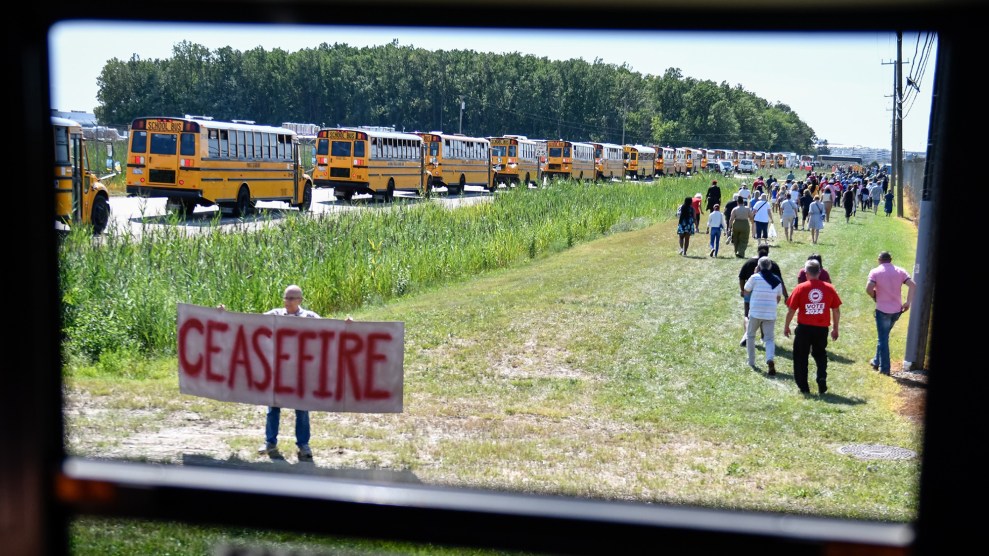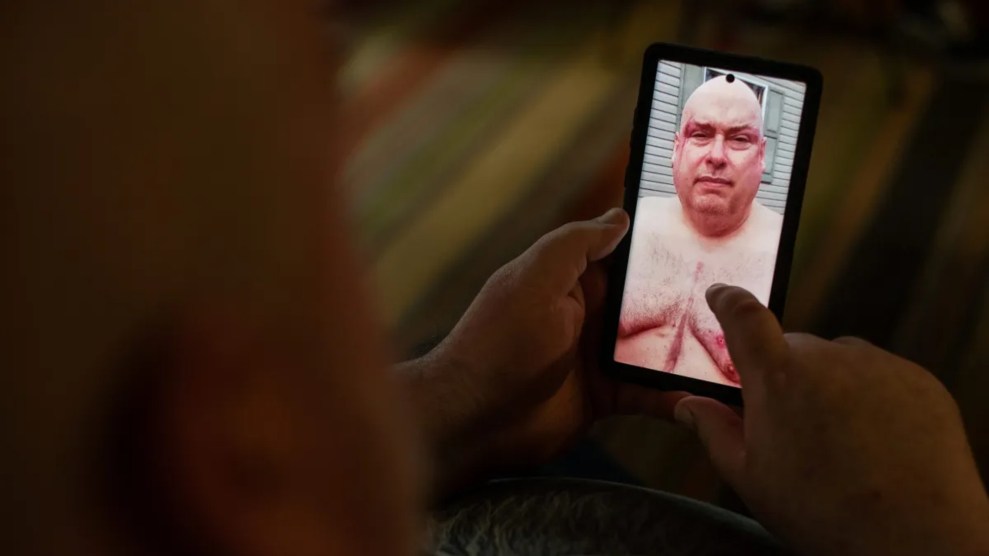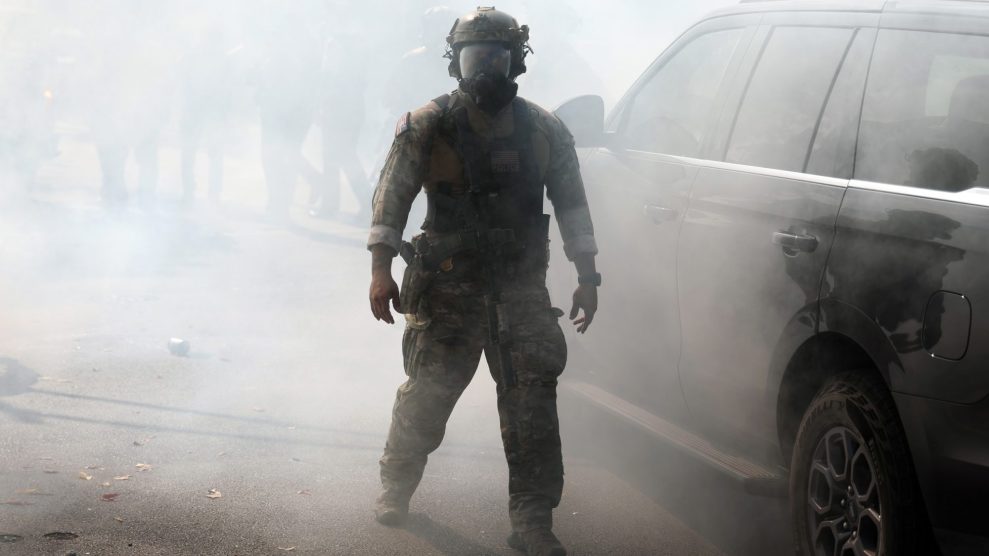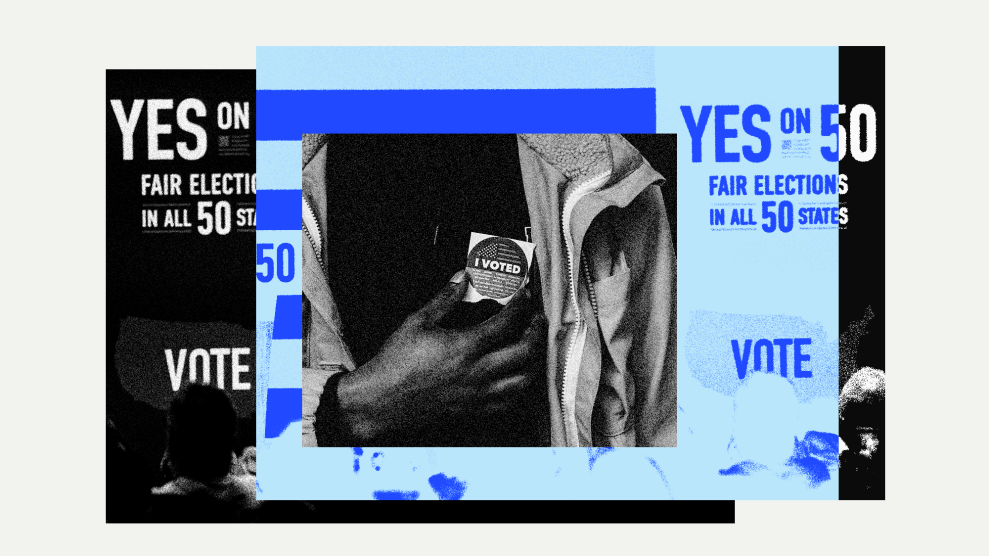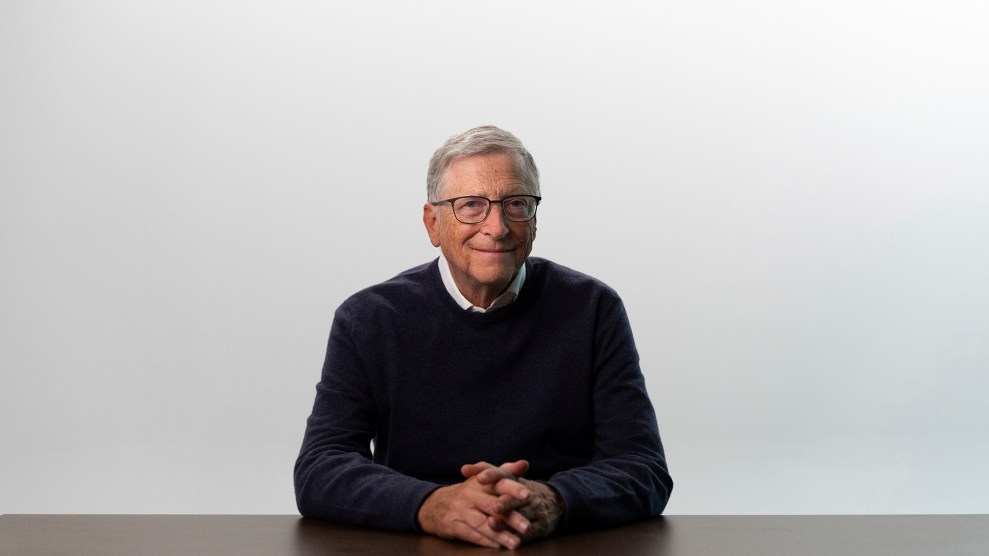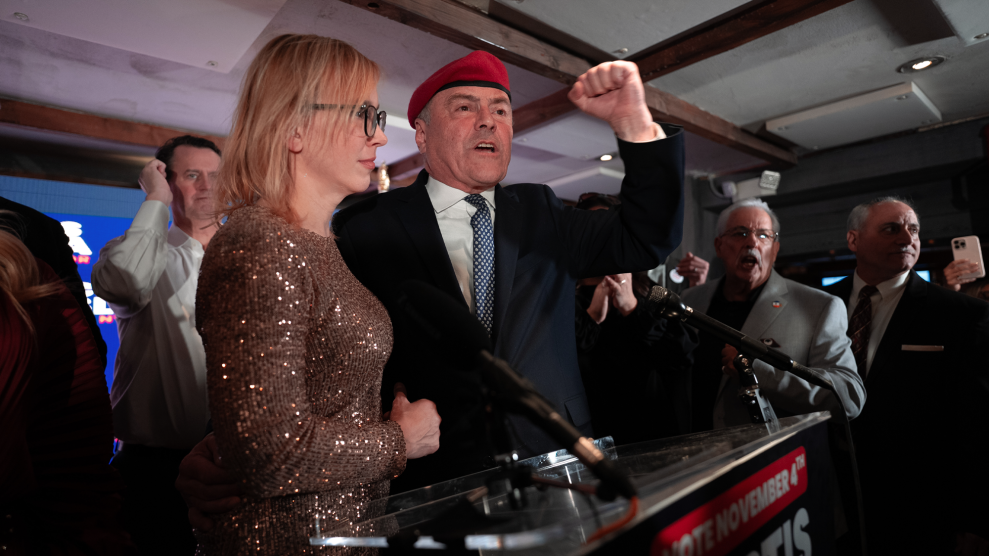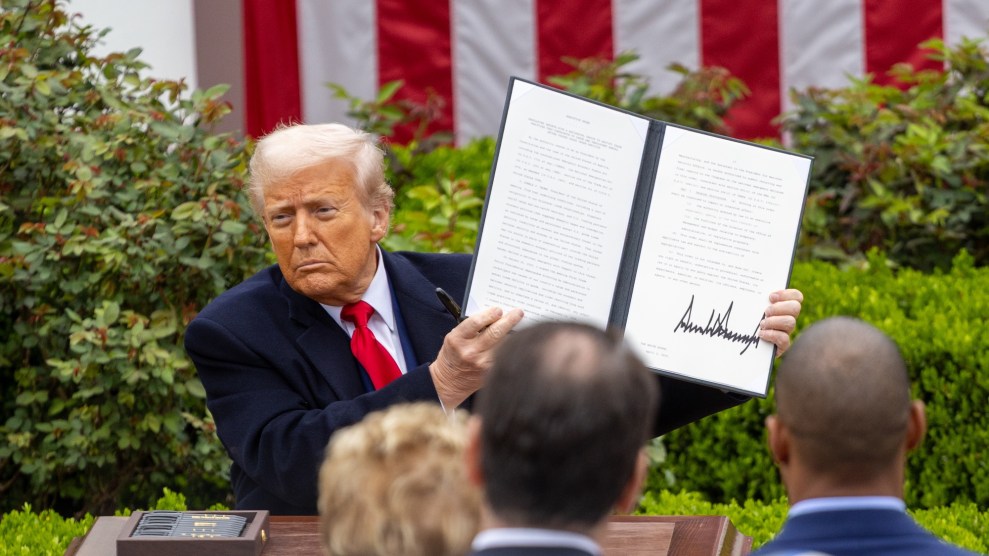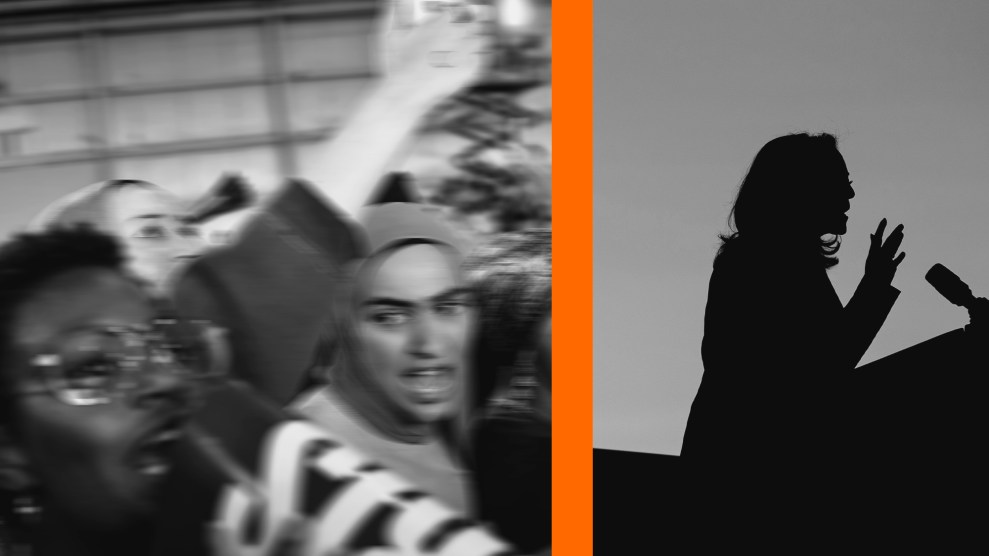
Mother Jones; Adam J. Dewey/Anadolu/Getty; Julia Nikhinson/AP
Salma Hamamy and Zainab Hakim are no strangers to disruption.
Over the last few months at the University of Michigan, the two have loudly called for the school to officially divest from Israel and its ongoing military offensive in Gaza. They were involved in their school’s Gaza solidarity encampment and briefly took over their campus administration building for about eight hours (before the police department pepper sprayed, removed, and arrested them).
But they never expected their action at Vice President Kamala Harris’ Detroit rally this week—in which they loudly yelled for a ceasefire, prompting Harris’ scorn—would gain so much attention.
The two shouted, “Kamala, you need to call for a ceasefire in Gaza. We demand an arms embargo and a free Palestine.” Then, they chanted: “Kamala, Kamala, you can’t hide, we won’t vote for genocide.” (Such actions have been common at President Joe Biden’s events for months.)
The vice president was both stern and direct in her response. “If you want Donald Trump to win, say that,” Harris commanded from the stage. “Otherwise, I’m speaking.”
Her supporters at the rally roared in applause, drowning out both Hamamy and Hakim, who were escorted out of the rally.
Following the Hamamy and Hakim protest, Phil Gordon, an adviser to Vice President Harris posted on social media that her position has been clear. “She will always ensure Israel is able to defend itself against Iran and Iran-backed terrorist groups. She does not support an arms embargo on Israel,” Gordon wrote. “She will continue to work to protect civilians in Gaza and to uphold international humanitarian law.” (The Harris campaign did not respond to questions in time for publication.)
The two activists spoke with Mother Jones about their protest, what they make of the vice president’s response, and the implications it has for the upcoming election.
This interview has been edited and condensed for clarity.
Why did you interrupt Vice President Kamala Harris’ speech, and what were you hoping to achieve?
Hamamy: If she is expecting to come to Michigan—because it is such a crucial swing state in the election—she must understand that there is a primary issue for Michigan voters. And it is the entire reason as to why we are in this predicament in the very first place and to why she’s actually running and why Biden dropped: It is because of the approach to Palestine.
And if she’s not going to take any crucial steps forward—or at least take a moral position—then there will be a movement that she must face. And she will face it through the protesters attending and disrupting and making it very clear where we stand.
How did you think she would react?
Hakim: I guess the closest thing that I had imagined is that we we would be told we weren’t interested in dialog and we were just interested yelling and that’s maybe what I imagined she would say.
And what do you make of the vice president’s retort? “If you want Donald Trump to win say that. Otherwise, I’m speaking.” Do you want Donald Trump to win?
Hamamy: No, of course not.
I think it’s a really interesting response. And a questionable response to people who are saying, we want an end to the genocide. The fact that her first response is: Oh, so you want Donald Trump to win. It just shows her inability to understand what constituents are saying.
“That is not a good way to act with people who have directly lost family members due to the ongoing genocide.”
When people are demanding a ceasefire and arms embargo and an end to the genocide and you say that we want Donald Trump to step in—it just shows a lack of accountability. It shows a lack of leadership, a lack of responsibility, and a lack of ownership.
There was a mix of reactions to her response online. I think some were applauding the vice president for being so direct—and shutting all of it down (like there was the head nod, the stare). And there were others who were far more skeptical, kind of realizing the Harris campaign is jeopardizing a win in Michigan by potentially alienating the large Arab-American community with that kind of response.
What did you make of how everyone reacted?
Hamamy: For the people who were applauding her body language or saying, “Oh, she shut those protesters up.” I was disturbed by them thinking that that was a good stance to take when someone is calling for a ceasefire. When someone’s calling for an end to weaponry shipments being sent overseas, that is not a good way to interact with constituents. That is not a good way to act with people who have directly lost family members due to the ongoing genocide.
Hakim: Obviously, I knew that this was going to be important. But I definitely did not process nearly how much attention it was going to get.
I think that the genre of response that was most surprising to me is the people who are like: Oh, well, this has changed people’s mind; and this is showing people who Kamala Harris really is—and she’s losing Michigan because of this.
I think what was most surprising to me is the idea that this one sentence of hers—as opposed to her consistent, decades-long support for Israel—could be the thing for someone to feel like, yeah, maybe Kamala Harris isn’t a good person.
There was even some discourse around this idea of interrupting a woman of color, particularly a woman of color in this case, and there’s a lot to unpack there. But do you think that’s a fair critique of your particular protest?
Hakim: I thought that was just bullshit, the whole interrupting a woman of color thing.
It’s important to remember that this disruption was obviously about Harris and about election-related stuff. But that’s not the message to take from this. The message isn’t that this is going to have consequences on the election. The message is that Kamala is a bad person for supporting the genocide of Palestinians.
Anyone reading this might ask, okay, but when the other candidate in this race is Donald Trump, who has used the term Palestinian as an insult, does this not hurt the cause that you are advocating for in the long term?
Hamamy: In the long term, the Republican Party and the Democratic Party have basically taken the same approach and same stance on the issue of Palestine. They are both pro-Israel in the same way. Primaries are both bought by AIPAC; they are both taking money from Zionist organizations. The only difference is just how they try to appeal to their voters, to make it seem like they care about human life.
So to me, as someone who keeps track of the ongoing issues in Palestine, the Republican Party and the Democratic Party are one and the same on this. And for them to constantly keep saying that we need to vote a Democratic member in and not the Republican Party, because they’re the lesser of two evils—and because one just has a less intense version of genocide (which I actually don’t find that to be true considering that the genocide is being aided by the Democratic Party right now). They just seem so concerned about a hypothetical genocide when there is an actual genocide that is happening in the current moment.
Often, people do not realize there are different strains of those protesting. That this is a diverse group of people who have internal disagreements, too, about how to push for a change. It’s not all one movement. Are you part of the Abandon Biden camp? Are you part of the Uncommitted movement? Like, where do you and the broader student protest movement stand across Michigan—are you all in one camp versus the other?
Hamamy: I am not in the Abandon Biden movement or the Uncommitted campaign, both of them have done amazing work. I do think there are some differences in approach at times in comparison to the student movement. The student movement is primarily focused on the fact that these politicians will never save us.
Communication is never going to get through their head. Us, you know, praying and hoping that they’re going to implement a ceasefire simply because we say that we have family members being killed—that is never going to happen. If the scenes and the video footage and the literal depiction of actual death, murder and slaughter—at one of the highest rates ever—coming out is not going to shake them enough to call for a ceasefire, then our words will never do that.
So what needs to happen is us withholding our vote and withholding any positive affiliation that we would give to the Democratic Party or to the Republican Party—or to whoever is perpetuating this genocide. And that is one of the main ways that I think the student movement goes forward. It is through continuous disruption and creating a social crisis throughout; to say that we will not operate as business as usual, so long as our tax dollars are funding a genocide that is killing so many people in Palestine.
Leaders of the Uncommitted Movement met with Vice President Harris before the rally and asked for another meeting—hoping to discuss an arms embargo and a permanent ceasefire. And we reported that she expressed openness to a meeting. Then, at the rally, there was the retort to you all. Is this a one-step forward, one-step back situation for the Harris campaign, or considering the ongoing Israeli offensive in both Gaza and the suffering currently in the West Bank, do you see it as no movement at all?
Hamamy: Kamala very clearly shared her words of sympathy with leaders of the Uncommitted campaign because of her worry about them not mobilizing the community to vote for her. She says one thing to one person and changes the moment she gets on stage, and there are several cameras around—it was very clear. And to me, what I’m going to prioritize is what her policies stand for, and what she said to the entire crowd and to the entire audience when she was challenged and when we said we’re not going to vote for genocide, as opposed to what her response would be to people on the side in private. So, to us, her response was one step forward in making the general population understand that she’s no different.
“The message isn’t that this is going to have consequences on the election. The message is that Kamala is a bad person for supporting the genocide of Palestinians.”
Hakim: In regards to Uncommitted: I definitely appreciate them for making clear the fact that Arab Americans and Muslim Americans are a significant voting bloc—and have power to sway the election whichever way, and I think that’s really important work that the committee did. But I also think that it’s important for all of us to remember that none of these options are gonna free Palestine or end the genocide and that appealing to Kamala Harris is not a solution in any way, shape, or form.
What people seem to be forgetting is that she’s not just like some random person who decided to run for president. She has been the vice president for all 300-plus days of this genocide, and could have said something in all of that time. She deliberately chose not to do that.
If the Harris campaign called and tried to hash this out and have a conversation, would you take that call?
Hamamy: If she wanted to hash this out, she needs to go to the Israeli government and say: We’re cutting off all military funding. There’s nothing to hash out with the voters. What needs to be hashed out is with the people who are committing genocide right now.

